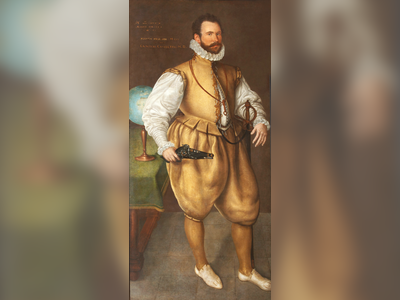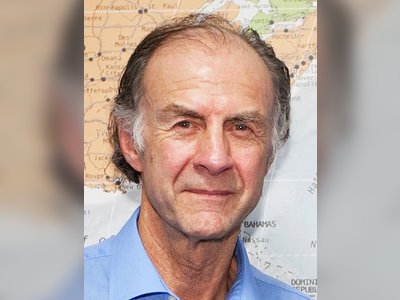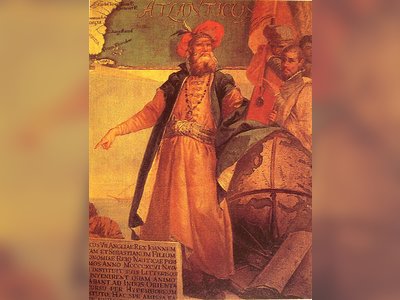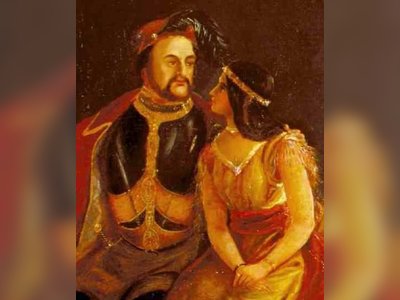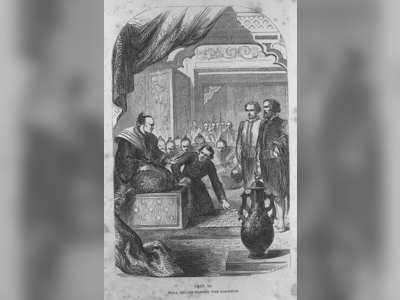British Heritage
Remember, Cherish, Learn.
beta
Freya Stark - Intrepid Middle East Traveller
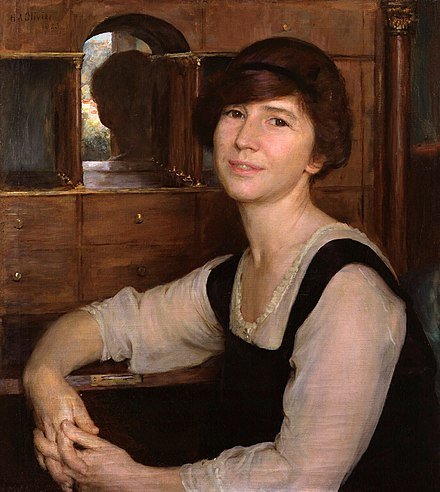
Contribution to British Heritage.
Dame Freya Madeline Stark DBE (31 January 1893 – 9 May 1993) holds an indelible place in British heritage as one of the most remarkable explorers and travel writers of the 20th century. Her extensive travels and prolific writings have left an enduring legacy that not only shed light on the distant and enigmatic lands of the Middle East and Afghanistan but also inspired countless adventurers and writers to follow in her footsteps.
Born to an English father and an eclectic European heritage, Stark's early fascination with the Orient, sparked by the gift of *One Thousand and One Nights* on her ninth birthday, planted the seeds of her future explorations. Her insatiable curiosity and desire to escape the constraints of her life in northern Italy led her to study Arabic and Persian at the University of London, embarking on a path that would forever change the landscape of British travel literature.
Freya Stark's legacy lies not only in her daring expeditions and meticulous travel accounts but also in her pioneering spirit as a woman in a male-dominated field. As one of the first non-Arabs to traverse the treacherous southern Arabian Desert, she shattered gender barriers and proved that women were more than capable of undertaking formidable journeys and producing valuable scholarship. Her achievements opened doors for countless female explorers and writers who followed in her wake, making her a trailblazer for gender equality in the world of exploration.
Moreover, Stark's contribution to British heritage is encapsulated in her extensive body of work, which comprises over two dozen books, autobiographical volumes, and essays. Her writings not only offered vivid portrayals of the lands she explored but also delved into the socio-political complexities of the regions, providing valuable insights for scholars, policymakers, and enthusiasts alike.
Stark's contributions to British heritage are multifaceted, extending beyond her literary achievements. As a photographer, she artfully captured the essence of the Middle East and Afghanistan, creating a visual record that enriches our understanding of these regions during the early 20th century. Her photographic legacy, preserved in the Freya Stark Photograph Collection at St Antony’s College, Oxford, offers a glimpse into the people, landscapes, and cultures she encountered during her travels.
During World War II, Stark's service as a propagandist for the British Ministry of Information showcased her dedication to her country's cause. Her eloquent advocacy for the British side and her efforts to disseminate information and create networks of support through the Ikhwan al Hurriya (Brotherhood of Freedom) exemplify her commitment to British interests in the Middle East.
Stark's success as an explorer and travel writer can be measured not only in the accolades she received but also in the impact she made on the literary and travel communities. Throughout her life, she received prestigious awards such as the Royal Geographical Society's Back Award in 1933 and the Royal Asiatic Society’s Richard Burton Memorial Medal in 1934. Her works garnered critical acclaim, and her books found avid readers both in Britain and internationally, captivating audiences with her evocative prose and adventurous spirit.
Beyond awards and recognition, Stark's success lies in her ability to connect with her readers and transport them to the exotic and mysterious landscapes she encountered. Her works continue to resonate with contemporary audiences, offering timeless insights into the cultures and histories of the Middle East and Afghanistan.
Freya Stark was born on 31 January 1893 in Paris to an English father, Robert, an artist from Devon, and a mother, Flora, of English, French, German, and Polish descent. Her early years were spent in northern Italy, where her fascination with the Orient was kindled. After a tumultuous childhood marked by her parents' separation and a disfiguring accident, Stark pursued her passion for languages and studied Arabic and Persian at the University of London.
Her travels began in the late 1920s, and over the years, she explored the remote and uncharted territories of the Middle East and Afghanistan. Her expeditions into western Iran, where she ventured into parts untouched by Westerners, earned her the esteemed Royal Geographical Society's Back Award. Stark's quest to trace the frankincense route of the Hadhramaut in southern Arabia, despite falling seriously ill, displayed her unwavering determination and adventurous spirit.
During World War II, Stark became an influential propagandist for the British cause, engaging in vital efforts to promote British interests in the Middle East. Her involvement in the Ikhwan al Hurriya propaganda network, aimed at garnering Arab support for the Allies, demonstrated her commitment to her country's objectives.
Throughout her life, Stark authored numerous books and essays, providing vivid accounts of her explorations and the cultures she encountered. Her writings received critical acclaim and contributed significantly to the literary and historical understanding of the Middle East.
In her later years, Stark continued to write and travel, visiting Afghanistan in 1968 at the age of 75 to explore the 12th-century Minaret of Jam. Her unparalleled achievements and the depth of her contributions to British heritage are a testament to her enduring legacy as an intrepid Middle East traveller and a literary luminary.
Freya Stark's life was filled with adventure, discovery, and a deep appreciation for the diverse cultures she encountered. Her fearless exploration of uncharted territories, coupled with her eloquent and insightful writings, have secured her place as a revered figure in the annals of British heritage. Her indomitable spirit, passion for exploration, and unwavering dedication to her craft continue to inspire generations of travellers and writers, making her an enduring icon in the world of exploration and travel literature.
Born to an English father and an eclectic European heritage, Stark's early fascination with the Orient, sparked by the gift of *One Thousand and One Nights* on her ninth birthday, planted the seeds of her future explorations. Her insatiable curiosity and desire to escape the constraints of her life in northern Italy led her to study Arabic and Persian at the University of London, embarking on a path that would forever change the landscape of British travel literature.
Legacy
Freya Stark's legacy lies not only in her daring expeditions and meticulous travel accounts but also in her pioneering spirit as a woman in a male-dominated field. As one of the first non-Arabs to traverse the treacherous southern Arabian Desert, she shattered gender barriers and proved that women were more than capable of undertaking formidable journeys and producing valuable scholarship. Her achievements opened doors for countless female explorers and writers who followed in her wake, making her a trailblazer for gender equality in the world of exploration.
Moreover, Stark's contribution to British heritage is encapsulated in her extensive body of work, which comprises over two dozen books, autobiographical volumes, and essays. Her writings not only offered vivid portrayals of the lands she explored but also delved into the socio-political complexities of the regions, providing valuable insights for scholars, policymakers, and enthusiasts alike.
Contributions to British Heritage
Stark's contributions to British heritage are multifaceted, extending beyond her literary achievements. As a photographer, she artfully captured the essence of the Middle East and Afghanistan, creating a visual record that enriches our understanding of these regions during the early 20th century. Her photographic legacy, preserved in the Freya Stark Photograph Collection at St Antony’s College, Oxford, offers a glimpse into the people, landscapes, and cultures she encountered during her travels.
During World War II, Stark's service as a propagandist for the British Ministry of Information showcased her dedication to her country's cause. Her eloquent advocacy for the British side and her efforts to disseminate information and create networks of support through the Ikhwan al Hurriya (Brotherhood of Freedom) exemplify her commitment to British interests in the Middle East.
Success
Stark's success as an explorer and travel writer can be measured not only in the accolades she received but also in the impact she made on the literary and travel communities. Throughout her life, she received prestigious awards such as the Royal Geographical Society's Back Award in 1933 and the Royal Asiatic Society’s Richard Burton Memorial Medal in 1934. Her works garnered critical acclaim, and her books found avid readers both in Britain and internationally, captivating audiences with her evocative prose and adventurous spirit.
Beyond awards and recognition, Stark's success lies in her ability to connect with her readers and transport them to the exotic and mysterious landscapes she encountered. Her works continue to resonate with contemporary audiences, offering timeless insights into the cultures and histories of the Middle East and Afghanistan.
General Information
Freya Stark was born on 31 January 1893 in Paris to an English father, Robert, an artist from Devon, and a mother, Flora, of English, French, German, and Polish descent. Her early years were spent in northern Italy, where her fascination with the Orient was kindled. After a tumultuous childhood marked by her parents' separation and a disfiguring accident, Stark pursued her passion for languages and studied Arabic and Persian at the University of London.
Her travels began in the late 1920s, and over the years, she explored the remote and uncharted territories of the Middle East and Afghanistan. Her expeditions into western Iran, where she ventured into parts untouched by Westerners, earned her the esteemed Royal Geographical Society's Back Award. Stark's quest to trace the frankincense route of the Hadhramaut in southern Arabia, despite falling seriously ill, displayed her unwavering determination and adventurous spirit.
During World War II, Stark became an influential propagandist for the British cause, engaging in vital efforts to promote British interests in the Middle East. Her involvement in the Ikhwan al Hurriya propaganda network, aimed at garnering Arab support for the Allies, demonstrated her commitment to her country's objectives.
Throughout her life, Stark authored numerous books and essays, providing vivid accounts of her explorations and the cultures she encountered. Her writings received critical acclaim and contributed significantly to the literary and historical understanding of the Middle East.
In her later years, Stark continued to write and travel, visiting Afghanistan in 1968 at the age of 75 to explore the 12th-century Minaret of Jam. Her unparalleled achievements and the depth of her contributions to British heritage are a testament to her enduring legacy as an intrepid Middle East traveller and a literary luminary.
Freya Stark's life was filled with adventure, discovery, and a deep appreciation for the diverse cultures she encountered. Her fearless exploration of uncharted territories, coupled with her eloquent and insightful writings, have secured her place as a revered figure in the annals of British heritage. Her indomitable spirit, passion for exploration, and unwavering dedication to her craft continue to inspire generations of travellers and writers, making her an enduring icon in the world of exploration and travel literature.
- Freya Starken.wikipedia.org
